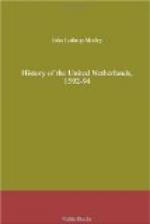But the Leaguers’ archbishop said that he could make no further advances. So ended the conference.’
The chiefs of the politicians now went to the king and informed him that the decisive moment had arrived.
Henry had preserved: his coolness throughout. Amid all the hubbub of learned doctors of law, archbishops-Leaguer and political-Sorbonne pedants, solemn grandees from Spain with Latin orations in their pockets, intriguing Guises, huckstering Mayennes, wrathful Huguenots, sanguinary cardinal-legates, threatening world-monarchs—heralded by Spanish musketeers, Italian lancers, and German reiters—shrill screams of warning from the English queen, grim denunciations from Dutch Calvinists, scornful repulses from the holy father; he kept his temper and his eye-sight, as perfectly as he had ever done through the smoke and din of the wildest battle-field. None knew better than he how to detect the weakness of the adversary, and to sound the charge upon his wavering line.
He blew the blast—sure that loyal Catholics and Protestants alike would now follow him pell-mell.
On the 16th, May, 1593, he gave notice that he consented to get himself instructed, and that he summoned an assembly at Mantes on the 15th July, of bishops, theologians, princes, lords, and courts of parliament to hold council, and to advise him what was best to do for religion and the State.
Meantime he returned to the siege of Dreux, made an assault on the place, was repulsed, and then hung nine prisoners of war in full sight of the garrison as a punishment for their temerity in resisting him. The place soon after capitulated (8th July, 1593).
The interval between the summons and the assembling of the clerical and lay notables at Mantes was employed by the Leaguers in frantic and contradictory efforts to retrieve a game which the most sagacious knew to be lost. But the politicians were equal to the occasion, and baffled them at every point.
The Leaguers’ archbishop inveighed bitterly against the abominable edicts recently issued in favour of the Protestants.
The political archbishop (of Bourges) replied not by defending; but by warmly disapproving, those decrees of toleration, by excusing the king for having granted them for a temporary purpose, and by asserting positively that, so soon as the king should be converted, he would no longer countenance such measures.
It is superfluous to observe that very different language was held on the part of Henry to the English and Dutch Protestants, and to the Huguenots of his own kingdom.
And there were many meetings of the Leaguers in Paris, many belligerent speeches by the cardinal legate, proclaiming war to the knife rather than that the name of Henry the heretic should ever be heard of again as candidate for the throne, various propositions spasmodically made in full assembly by Feria, Ybarra, Tassis, the jurisconsult Mendoza, and other Spanish agents in favour of the Infanta as queen of France, with Archduke Ernest or the Duke of Guise, or any other eligible prince, for her husband.




